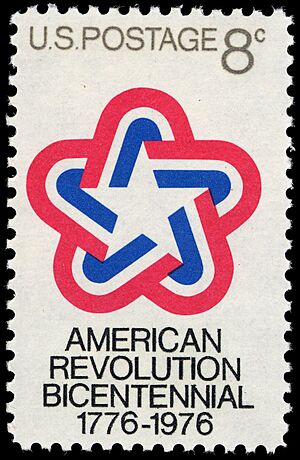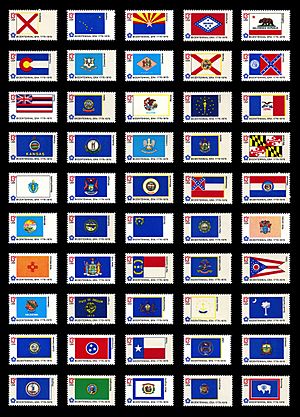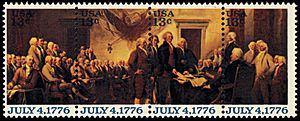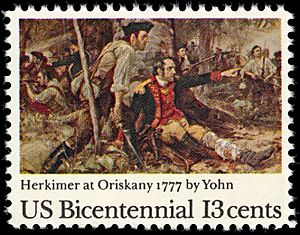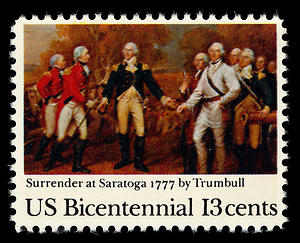Bicentennial Series facts for kids
The Bicentennial Series was a special collection of postage stamps released in the United States. These stamps celebrated America's 200th birthday, known as the United States Bicentennial. The series began on July 4, 1971, and ended on September 2, 1983.
Many of these stamps featured the Bicentennial logo or words like "US BICENTENNIAL." They helped people remember important events and people from the time when America became an independent nation.
Contents
Early Stamps and Key Events
After the first stamp in 1971, only a few more were released until 1974. Each year, usually on July 4, four new stamps came out.
- In 1972, stamps honored Colonial craftsmen.
- In 1973, they showed how people communicated in Colonial times.
- In 1974, stamps celebrated the First Continental Congress.
Also in 1973, a set of four stamps was released for the 200th anniversary of the Boston Tea Party. This event was a protest against British taxes.
The Revolutionary War Begins
In 1975, the series really got going as it was the 200th anniversary of the start of the American Revolutionary War.
- Four stamps honored "Contributors to the Cause." These were people who helped the American Revolution. One well-known person featured was Haym Salomon.
- On July 4, another set of four stamps showed different uniforms worn during the Revolutionary War.
- With the 200th anniversary of the Battles of Lexington and Concord, a new style of stamp began. These stamps showed a detail from a painting of the event. They also included the event's name, the year, and "US BICENTENNIAL" with the stamp's value. This "painting" style continued with a stamp for the Battle of Bunker Hill in June.
Celebrating 1976
The year 1976 was a big one, marking 200 years since the Declaration of Independence.
- On January 1, 1976, three stamps were released showing the famous "Spirit of 76" painting.
- On February 23, a large sheet of 50 stamps was issued. Each stamp showed a different state flag and included the Bicentennial logo.
- Four special souvenir sheets were made for an international stamp show called INTERPHIL. These sheets featured famous paintings of Revolutionary War events.
- A Bicentennial stamp honoring Benjamin Franklin was also released.
The Declaration of Independence Stamps
The United States Postal Service originally planned to release a huge sheet of 50 stamps showing the entire United States Declaration of Independence. However, this plan was changed.
Instead, on July 4, a strip of four stamps was issued. These stamps showed part of a famous painting by John Trumbull. The painting shows the presentation of the Declaration of Independence.
Later Bicentennial Stamps
In 1977, more "painting-style" stamps were released.
- One honored George Washington's successful battle at Princeton.
- Others commemorated the Battle of Oriskany and the Battle of Saratoga.
- On July 4, four stamps honored skilled workers with the title "Skilled Hands for Independence."
- Additional stamps celebrated the Articles of Confederation and the arrival of Lafayette.
By 1978, public interest in the Bicentennial was fading. Only one stamp was issued that year, noting the French Alliance. In 1979, a stamp depicted John Paul Jones.
The next stamps in the series didn't appear until 1981, when two stamps marked the Battle of Yorktown. The very last stamp in the series was issued in 1983. It was in the "painting" format and honored the Treaty of Paris, which officially ended the Revolutionary War.
Other Bicentennial Items
Besides stamps, the Postal Service also released other items like postal stationery. These included postal cards that marked the 200th anniversaries of less famous but still important battles, like the Battle of Cowpens.
Many other postal items, such as envelopes and cards, also had Bicentennial themes. For example, a special 1976 coil stamp for bulk mail showed a drum and said, "Beat the Drum for Liberty and the Spirit of 76."
Images for kids
 | Valerie Thomas |
 | Frederick McKinley Jones |
 | George Edward Alcorn Jr. |
 | Thomas Mensah |


